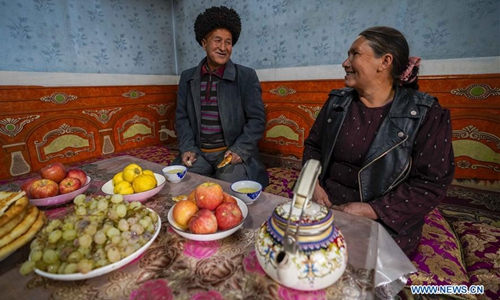
A man and his wife rest in their house at the Qushou Village of Saybag Township in Moyu County, northwest China's Xinjiang Uygur Autonomous Region, Nov. 21, 2019. A series of housing projects in 22 impoverished counties in southern Xinjiang Uygur Autonomous Region have benefited around 396,100 households since 2018, not only providing better homes for those who once lived in shabby residences but also boosting their source of livelihood. Measures including "toilet revolution" and flower planting have been carried out in these poverty-stricken villages. Based on the successful experience in the south of Xinjiang, local authorities have pushed forward the building of "beautiful courtyard" project in all villages of Xinjiang in a bid to improve locals' living standards since 2019. Photo:Xinhua
Foreign countries and experts have joined forces to condemn the passage of the so-called "Uyghur Human Rights Policy Act of 2019" by the US House of Representatives despite China's strong opposition.
They said that the US move interferes in China's internal affairs, slanders human rights conditions in Xinjiang, smears China's efforts against terrorism and extremism, and exposes US double standards on anti-terrorism.
The Syrian Foreign Ministry expressed its condemnation in a statement that said that the passage of the Xinjiang-related bill by the US House of Representatives violates international law and interferes in China's internal affairs.
The Chinese government is committed to cracking down on terrorism, extremism and separatism, and has contributed to the international anti-terrorism cause, said the Syrian Foreign Ministry, adding that China has the right to safeguard its sovereignty, territorial integrity and national security.

Children water flowers in an alley at Qianjin Village in Kashgar, northwest China's Xinjiang Uygur Autonomous Region, Aug. 18, 2019. Photo:Xinhua
Iran's Foreign Ministry said in a statement that meddling in the internal affairs of sovereign states has become a regular act of the United States, which has a history of exterminating Native Americans and enslaving Africans and has triggered innocent deaths in Afghanistan, Iraq, Syria, Libya, Yemen and other countries.
The United States is not qualified to comment on human rights and racial issues as well as the ethnic affairs of other countries, the statement said.
Sonia Bressler, a French expert on China, has visited Xinjiang several times. In her opinion, Xinjiang is a place where many ethnic groups live together harmoniously.
She said the passage of the Xinjiang-related bill mirrored Washington's hegemonic mindset to use "human rights" as a cover to mislead public opinion.
Ezzat Saad, director of the Egyptian Council for Foreign Affairs, paid a visit two years ago to Urumqi, capital city of the Xinjiang Uygur Autonomous Region. He said that Xinjiang's economic development and social progress are closely related to its anti-terrorism and anti-extremism measures.
No country has the right to interfere in Xinjiang affairs, which are China's internal affairs, he said, adding that the United States using the so-called "human rights issues" to meddle in China's internal affairs is "blackmail."
Bambang Suryono, an Indonesian scholar and president of the Jakarta-based think tank Nanyang ASEAN Foundation, said the Xinjiang-related bill passed by the US House of Representatives, which ignores the facts and confuses right with wrong, is an example of hegemonism and interventionism.
The effective policies implemented by the Chinese government focus on the long-term stability and sound development of Xinjiang, providing inspiration to other countries, Suryono said.


